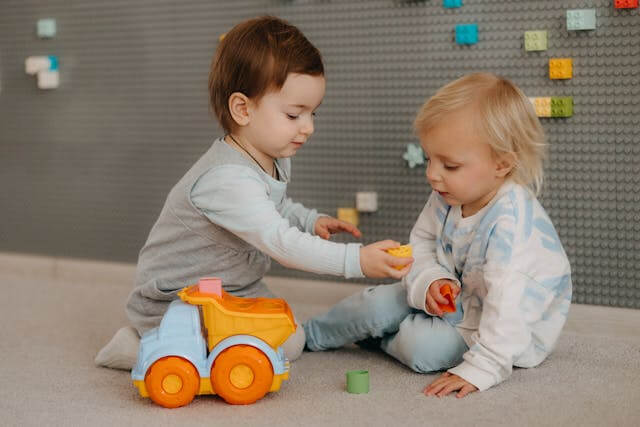You know the moment. Your child is happily playing with a toy at the park, another child wanders over, and instantly you feel it, that little jolt of pressure: Oh no… now I have to make them share.
So you jump in with the familiar script: “It looks like they want a turn. Remember, we share our toys.” And suddenly, what was a peaceful morning becomes a test: Will your child hand it over quickly enough to avoid the awkward stares?
Sharing isn’t actually the most important lesson in that moment.
What children need in these moments isn’t pressure to share; it’s support in communication, patience, and autonomy.
We throw the word share around so casually, and somewhere along the way, it became a moral benchmark for toddlers, as if the earlier a child shares, the kinder or more socially successful they will be, and the better the parent behind them.
We rarely talk about the unintended lessons forced sharing teaches.
Children who are compelled to hand over a toy before they’re ready often learn to ignore their own needs. They learn that pleasing others, even strangers at the park, is more important than their own joy, boundaries, or autonomy. After more than two decades observing children in classrooms, homes, and coaching sessions, I’ve watched these tiny moments shape patterns of self-abandonment, resentment, and confusion.
This is why I no longer teach children to share. Instead, I teach them to communicate.
Let’s look at another common scenario. The youngest sibling walks up to an older one, grabs the truck out of their hands, the older child responds with a startled, “Hey!” The parent turns, not to the child who grabbed, but to the one who had the toy, and says, “Just give him the toy.”
In that moment, the older child feels dismissed. They feel unprotected. They feel that the younger child’s wants matter more than their own. And the younger child? They’ve just learned that taking gets rewarded. They’re likely to do it again.
I know this might sound dramatic, but in that moment, the younger child is acting as the “bully”, not out of malice, but out of immaturity. They want to participate in play, and they don’t yet know how. Most younger siblings don’t actually want the toy their older sibling has, they want the connection. They want access to the play. And often, once they get the toy, they lose interest within minutes because the older child walked away.
So instead of stepping in with “You need to share,” Try teaching both children something far more powerful: “Can I use it when you’re done?” or “You can have it when I’m done.”
Scripts like these support skills that toddlers are actually ready to learn: waiting, self-regulation, and considering others’ feelings without asking them to give up something before they’re developmentally prepared to.
This simple sentence shifts everything. It gives the approaching child a way to enter play respectfully. It gives the child holding the toy a sense of safety and autonomy as well as the opportunity to complete their play. It teaches both children patience, communication, turn-taking on their terms, and awareness of others; skills that matter far more than sharing.
For children, toys hold emotional value. It’s not the object, it’s the play that matters. That moment is their project, their joy.
When children know they can finish their play and then hand over the toy, they almost always share more willingly and often much sooner than you’d expect. Sharing becomes a choice, not a demand.
So instead of assuming your child won’t share, try trusting that they will. Model it at home. Use language that respects both children. Teach them the words that build patience, delayed gratification, and compassion.
When children feel safe in their ownership, secure in their autonomy, and supported in their communication, generosity doesn’t need to be taught. It grows naturally.
ABOUT THE AUTHOR
Kristin Schmoke is a mother of 4, teacher, coach, DIYer, gardener, and nature lover. She is on a mission to help parents replace quick-fix discipline with connected, collaborative parenting. Through her work, she is dedicated to helping you simplify the challenges of parenthood while fostering deeper, more meaningful connections with children. With 25 years of experience as a teacher, Kristin has had the unique opportunity to observe child development at every stage, allowing her to refine her approach and support families wholeheartedly and fully. She is the Parent Coach at Empowered Educator: https://empowerededucator.com/
RELATED ARTICLES
Cover photo provided by Polesie Toys

